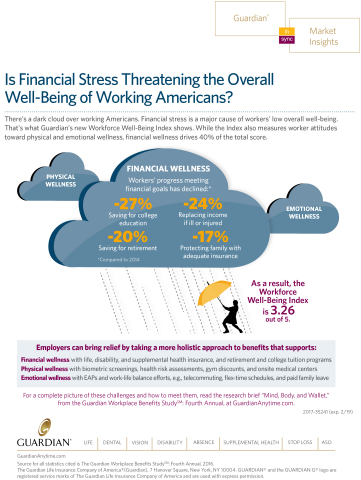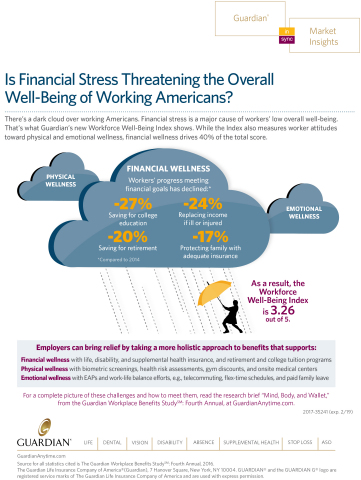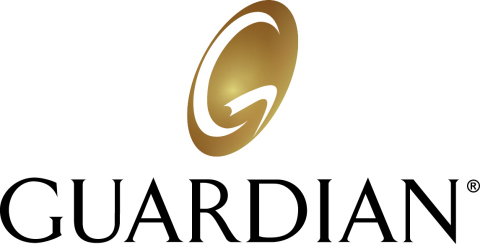NEW YORK--(BUSINESS WIRE)--The Guardian Life Insurance Company of America (Guardian), one of the nation’s largest mutual life insurers and a leading provider of employee benefits, today released Mind, Body and Wallet, the latest set of findings from the Fourth Annual Guardian Workplace Benefits Study SM. The research reveals that anxiety over personal finances is the leading cause of emotional stress and contributes to lower physical wellness. While the study shows that many working Americans are dealing with financial and emotional trouble, single working parents and Generation X are feeling particularly vulnerable since two in five are struggling to keep up with expenses and save for retirement.
The study’s Workforce Well-being Index identifies financial wellness as the most significant driver of overall well-being and highlights how progress toward financial goals has declined in the past two years. A majority of workers cite money as their primary source of stress, indicating that they struggle with saving for retirement and college education, managing debt and protecting their family in the event of death, serious illness or injury.
The new Guardian research also reveals the following:
- One in four workers has no life insurance at all; the same is true of single working parents. Among those with life insurance, two in five believe they need more coverage, especially those who are married with children.
- One in three workers (and one in two millennials) has no disability insurance at all. Three in five workers say they could not live off of their savings for more than six months if they became ill or injured.
- One in five workers (and one in three single parents) has no retirement plan. Only two in five workers feel they are making good progress toward their retirement goals.
“Our research shows that working Americans face financial difficulties, which can be stressful and makes it hard to focus on their overall well-being,” said Dave Mahder, Vice President and Chief Marketing Officer of Guardian’s Group and Worksite Markets business. “Even among people working full-time with benefits, many still do not have access to adequate insurance coverage or retirement plans. And few take advantage of the health and wellness programs available through their employers, which often contain a much broader menu of resources than workers realize.”
Mind, Body, and Wallet finds that more companies are attempting to improve their employees’ well-being through a variety of initiatives, such as supplemental health insurance, and health and wellness activities. Yet, while more than half (52 percent) of working Americans said they have access to wellness programs through their employer, only one in four have participated in any of the activities offered. More effective communication and promotion of health and wellness programs, and insurance products available at the workplace would likely lead to greater awareness and participation.
Benefits programs that can help improve workforce well-being include:
- Financial wellness: Voluntary insurance products to fill financial protection gaps, including life, disability and supplemental health insurance; retirement savings plans; and college tuition/loan payment programs.
- Emotional wellness: Employee Assistance Programs for counseling with anxiety, substance abuse and relationship issues; work-life balance benefits like telecommuting, flexible schedule, and paid family leave.
- Physical wellness: Biometric screenings, health risk assessments, on-site medical centers, gym discounts, wearables to track fitness, and incentives for nutrition and preventive care.
Guardian’s Financial Confidence Quiz is available to help working Americans gauge their current financial confidence and identify practical steps for improvement.
For more information about Guardian’s workplace benefits solutions or to obtain a copy of Mind, Body and Wallet from the Fourth Annual Guardian Workplace Benefits Study SM, please visit https://www.guardiananytime.com/gafd/wps/portal/fdhome/insights-perspectives/emerging-trends/employee-well-being-financial-stress-study or Guardian Anytime.
About Guardian
The Guardian Life Insurance Company of America® (Guardian) is one of the largest mutual life insurers, with $7.3 billion in capital and $1.5 billion in operating income (before taxes and dividends to policyholders) in 2015. Founded in 1860, the company has paid dividends to policyholders every year since 1868. Its offerings range from life insurance, disability income insurance, annuities, and investments to dental and vision insurance and employee benefits. The company has approximately 8,000 employees and a network of over 2,750 financial representatives in 57 agencies nationwide. For more information about Guardian, please visit our website www.GuardianLife.com. You can also follow Guardian on Facebook, LinkedIn, Twitter and YouTube.
Financial information concerning The Guardian Life Insurance Company of America® as of 12/31/15 on a statutory basis: Admitted Assets = $48.1 Billion; Liabilities = $42 Billion (including $37 Billion of Reserves); and Surplus = $6.1 Billion.




